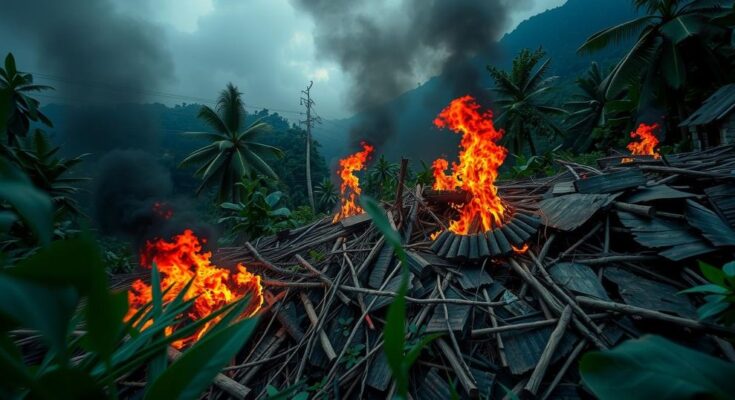The Democratic Republic of Congo’s ongoing conflict is rooted in post-colonial power struggles, exacerbated by ethnic tensions, political corruption, and competition over natural resources. The conflict, particularly severe in the east, has resulted in widespread violence, humanitarian crises, and the emergence of numerous armed groups. Key factors include weak governance, historical grievances, and foreign interventions, leaving millions affected by violence and displacement.
The persistent conflict in the Democratic Republic of Congo (DRC) finds its origins in post-colonial struggles for power, ignited post-independence from Belgium in 1960. Ethnic discord, political rivalry, rampant corruption, and competition over the country’s abundant natural resources have all contributed to decades of unrest. The eastern DRC has particularly suffered since the 1990s, with non-stop inter-communal violence spreading to regions such as Kasaï and Kwilu. Currently, more than a hundred active armed groups operate in the DRC, primarily local militias formed in the context of longstanding instability. These groups are influenced by evolving loyalties dictated largely by ethnic identity and political interests. The factors perpetuating the DRC’s turmoil include poor governance and the failure of post-colonial state-building, as well as long-standing rivalries due to colonial history. The inextricable link between ethnic divisions and resource exploitation aggravates the situation. The DRC’s natural wealth — including vital minerals like coltan and gold — fuels conflict as armed factions vie for control. The legacy of Mobutu Sese Seko’s dictatorship (1965-1997), characterized by severe corruption and ineffective governance, left a vacuum that armed groups have exploited. Additionally, the involvement of foreign entities, particularly Rwanda and Uganda, exacerbates the conflict. Historical events, notably the aftermath of the 1994 Rwandan genocide, have had a profound effect, igniting a series of conflicts leading to the First and Second Congo Wars that drew in multiple neighboring nations. The ramifications of ongoing conflicts on the Congolese populace are devastating. Civilians suffer from rampant violence, displacement, and lack of basic necessities — a humanitarian catastrophe. Statistics indicate over 6 million deaths linked to conflict since 1998, with ongoing violence causing significant casualties. Gender-based violence is alarmingly prevalent, with an estimated 1.5 million women subjected to sexual assault throughout their lives. Human rights violations manifest in forms such as mass rapes, torture, and arbitrary detentions, while millions remain internally displaced, lacking food, healthcare, and education. To halt the ongoing violence in the DRC, establishing justice and accountability for victims is crucial. This includes addressing historical grievances and providing humanitarian assistance, which would help mend the fabric of society torn by years of violence. Empowering local civil societies and ensuring a forum for truth and reparations for the impacted communities is essential for the path toward healing and stability.
The conflict in the Democratic Republic of Congo (DRC) is rooted in a complex interplay of historical injustices, political instability, and economic exploitation. The nation gained independence from Belgium in 1960, only to be beset by decades of conflict fueled by ethnic tensions and competition for control over its rich natural resources. The eastern region of the DRC stands as the epicenter of violence, experiencing an ongoing state of crisis exacerbated by the involvement of foreign powers and historical grievances stemming from colonial rule. The consequences of these conflicts are profound, severely impacting the civilian population and leading to widespread suffering and displacement.
In summary, the Democratic Republic of Congo’s crises are deeply embedded in its historical legacy, characterized by ethnic strife, resource exploitation, and failures of governance. The continued violence poses severe humanitarian challenges, affecting millions of civilians. There is an urgent need for justice, reparation, and humanitarian aid to break the cycle of violence and work towards a peaceful resolution.
Original Source: www.amnesty.org




